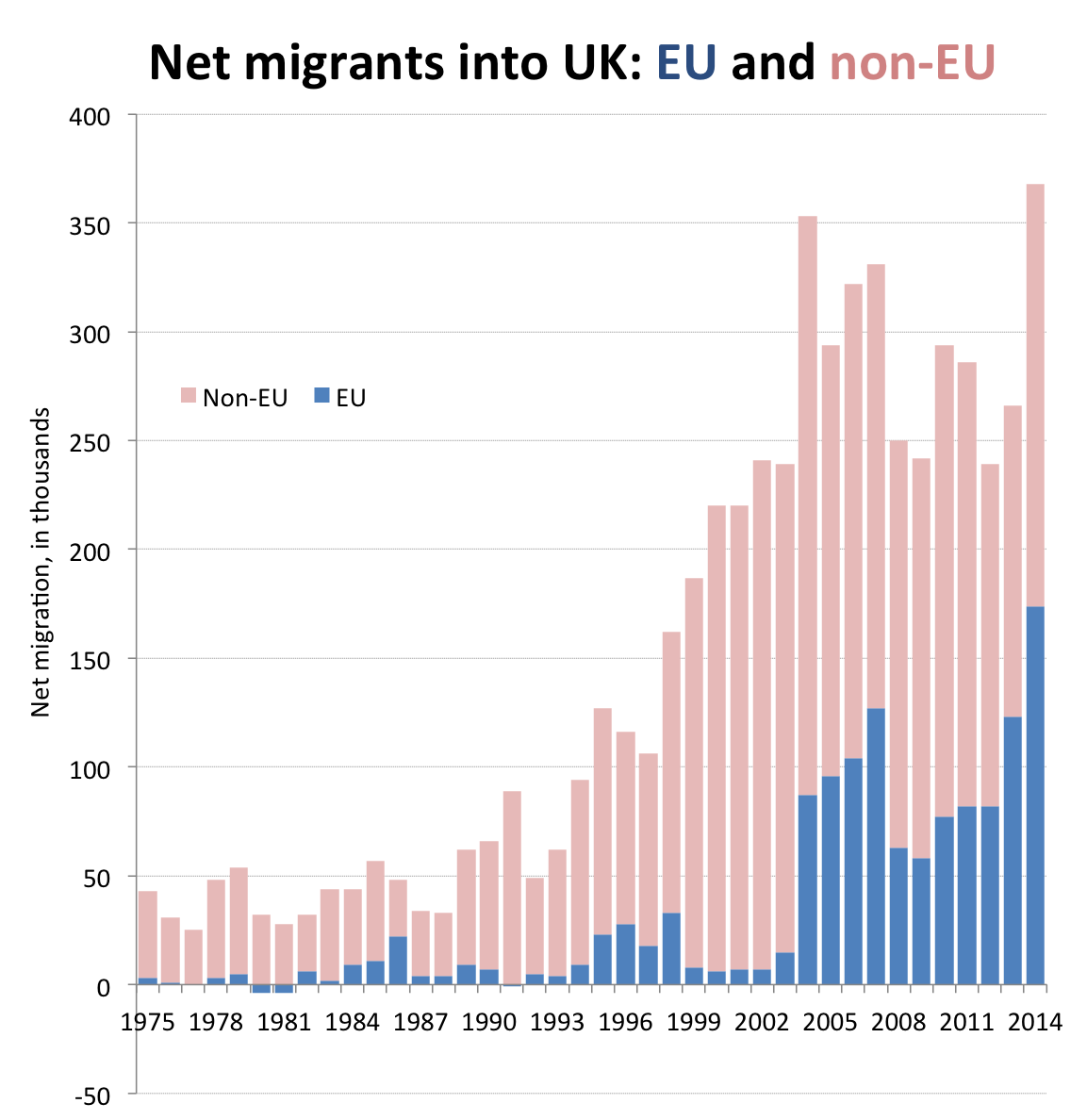EU referendum: The chart that shows how wrong the Brexit campaign is on immigration
EU countries have been a minor factor driving immigration since 1990 - and Brexit wouldn't bring net migration down to 'the tens of thousands'

Just 24 per cent of net migration since 1990 is down to the UK’s membership of the European Union, analysis by the Independent can reveal.
The findings throw cold water on the increasingly histrionic statements about immigration made in recent weeks by Vote Leave, the official campaign for Brexit, as well as claims made this week by The Sun and Migration Watch.
A total of 76 per cent of net migration by non-British citizens over the past 25 years has come from non-EU countries.
Leaving the EU would have no effect on levels of net migration from these countries; ‘net migration’ is the number of people immigrating to the UK minus those emigrating from it.
The chart below dates to 1975, just after the UK joined the EU. Full 40-year figures show an even smaller proportion of immigration has been from the EU.

The Independent’s analysis is based on data provided by the Office of National Statistics. And their data lets us assign a specific host country to 2.1 million of the 5.2 million net migrants who have come to the UK since 1990, when immigration levels began to rise.
These 2.1 million cover the most significant countries: around 40 per cent have come from India, Pakistan and Bangladesh; with 15 per cent from China; 11 per cent from the Australia, South Africa, New Zealand and Canada; 5 per cent from the USA; and 3 per cent from the Philippines.
10 per cent have come from Western Europe countries, mainly from Germany, France and Italy, with the other 15 per cent or so coming from countries that joined the EU more recently, such as Poland, Lithuania and Romania.
ONS measure migration through their ‘International Passenger Survey’, which runs all year-round and questions people entering and leaving the UK at airports, ferry terminals and the Channel Tunnel, using their responses to estimate migration for the entire country.
The analysis also reveals that migrants from Poland – the fourth most popular host country since 1990, after India, China and Pakistan – are coming to England far less than they did in the mid-2000s and are increasingly emigrating back to Poland.
Between 2009 and 2014, between 27,000 and 34,000 Poles migrated to England each year. That’s half as many per year as immigrated in 2005 to 2008. And an average of 17,000 per year have returned to Poland in the six years since 2009.

It is migrants from India, China and Pakistan who are arriving in the UK in far greater numbers, and have so far been less likely to leave.
Net migration from India was more than twice as high as from Poland in 2014, the latest year for which detailed data is available, and an average of 49,000 Indians have arrived in the UK every year for the past decade, while only 12,000 per year have left.
The UK has also become more Chinese than Polish since 2005, with 30,000 migrants arriving on average each year from China and 11,000 departing.
The figures also capture the churn in the past decade of migrants from less remarked-upon countries, such as Australia (18,000 per year arriving and 15,000 departing) and the USA (19,000 arriving, 11,000 departing).
While many tabloid headlines over the past decade have focused on Poland, and other Eastern European countries like Lithuania and now Romania, the data shows how a country like Pakistan – while it was no longer a top ten host country for immigrants in 2013 and 2014 – has actually contributed more net migrants to the UK since 1990 than Poland; the emigration rates of its migrants are very low, they stay in the UK.
Regardless of one’s views about immigration into the UK, and ignoring any of its potential cultural, economic or psychological benefits, the numbers tell a clear story: Brexit will not bring net migration down into the ‘tens of thousands’.
For that to happen Britain must change its approach to migrants from India and China, but students from these countries effectively fund much of the UK’s higher education sector, subsiding British students.

Without Indian and Chinese students (88 per cent of Chinese immigrants in 2014 were aged 15-29, 56 per cent of Indian immigrants were), domestic tuition fees would have to rise drastically.
There are few easy fixes. And when it comes to immigration, the data suggests Brexit would solve very little.

The EU referendum debate has so far been characterised by bias, distortion and exaggeration. So until 23 June we we’re running a series of question and answer features that explain the most important issues in a detailed, dispassionate way to help inform your decision.
What is Brexit and why are we having an EU referendum?
Will we gain or lose rights by leaving the European Union?
What will happen to immigration if there's Brexit?
Will Brexit make the UK more or less safe?
Will the UK benefit from being released from EU laws?
Will leaving the EU save taxpayers money and mean more money for the NHS?
What will Brexit do to UK trade?
How Brexit will affect British tourism
What will Brexit mean for British tourists booking holidays in the EU?
Will Brexit help or damage the environment?
Join our commenting forum
Join thought-provoking conversations, follow other Independent readers and see their replies
Comments
Bookmark popover
Removed from bookmarks